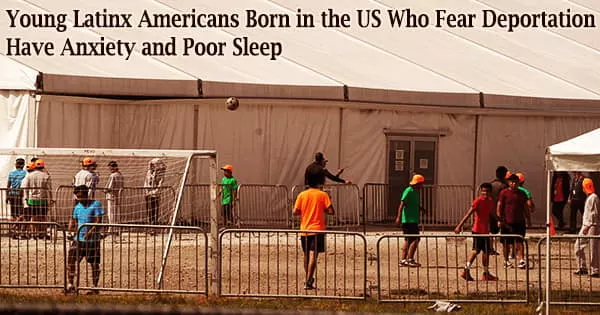According to a new study led by researchers at the University of California, Berkeley, the rise of anti-immigration rhetoric and policies in the US following the 2016 presidential election may be having a negative impact on the health of California’s Latinx youth, including those who are US citizens.
In California, the study followed the physical and mental health of American-born children of immigrants from Mexico and Central America before and after the 2016 presidential election. Additionally, it inquired about their sleep patterns and level of stress regarding the personal repercussions of American immigration laws.
Nearly half of the young people said they occasionally worried about how American immigration law might affect their families. The anxiety levels and sleep quality of those who worry more were higher than those of their peers.
When the researchers analyzed the youths’ wellbeing before and after the election, they discovered that those who expressed greater fear about immigration policies experienced more pronounced increases in anxiety symptoms.
“We’re seeing an increase in anxiety that is related to kids’ concern about the personal consequences of U.S. immigration policy, and these are U.S. born citizens,” said Brenda Eskenazi, the Brian and Jennifer Maxwell Endowed Chair in Public Health in UC Berkeley’s School of Public Health.
“Further, these are kids in California, a sanctuary state with more protective policies for immigrant families, compared to many other states,” Eskenazi said. “So, this study is probably reflecting the best-case scenario of how children of immigrants in other states are being affected.”
Eskenazi is the lead and corresponding author of a paper describing the results that appears June 24 in the Journal of the American Medical Association: Pediatrics.
The Center for the Health Assessment of Mothers and Children of Salinas (CHAMACOS), a long-term study of Mexican farmworker families in California, collected mental and physical health information on 397 Latinx kids. Each participant in the study had at least one immigrant parent, although it was unknown what kind of documents they had.
Before the 2016 presidential election, researchers measured kids’ blood pressure, body mass, signs of anxiety and sadness, and overall health at the age of 14. A year later, at the age of 16, they repeated the assessment.
The Pittsburgh Sleep Quality Index and the Perceived Immigration Policy Effects Scale (PIPES) were also completed by youths at their evaluations at age 16, which evaluated their degrees of concern on how U.S. immigration policy might affect their families.
It’s not just that these youth are faced with the prospect of ICE coming to their door and taking away their parents, but in addition to that, they are having to navigate through settings that may not feel friendly in this political climate, in order to help themselves and their parents.
Julianna Deardorff
According to the PIPES poll, between 41 and 45 percent of teens said they are occasionally concerned “about the impact of immigration policy on the family,” “about family separation due to deportation,” or “that a family member would be reported to immigration officials.” Teenagers who had these worries slept less well and had higher levels of anxiety than the other teens.
“These results are problematic because high levels of anxiety are not necessarily fleeting,” said Nancy Gonzales, dean of natural sciences at Arizona State University and co-author on the paper.
“They can impact other aspects of children’s well-being including their ability to stay focused in school, and if they are living with prolonged anxiety, that also has long-term effects on their physical health and susceptibility to problems like alcohol and substance abuse.”
The study’s co-author Julianna Deardorff, an associate professor in the Maternal and Child Health Program at UC Berkeley’s School of Public Health, noted that these teenagers’ higher levels of anxiety are probably compounded by the additional difficulties and responsibilities that come with having immigrant parents, such as translating for Spanish-speaking family members into English and guiding them through U.S. institutions and services.
Deardorff continued, “The dread of having a family member reported may also prevent them from obtaining treatment.”
“It’s not just that these youth are faced with the prospect of ICE coming to their door and taking away their parents, but in addition to that, they are having to navigate through settings that may not feel friendly in this political climate, in order to help themselves and their parents,” Deardorff said.
Currently, the team is checking in with the teens at age 18 to see if the rise in anxiety seen in the year after the election has persisted. In addition, it evaluates the youths’ academic standing and their propensity for high-risk conduct.
















